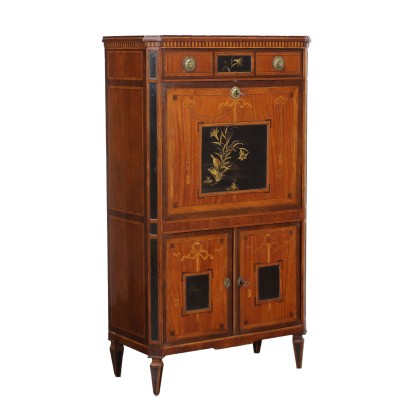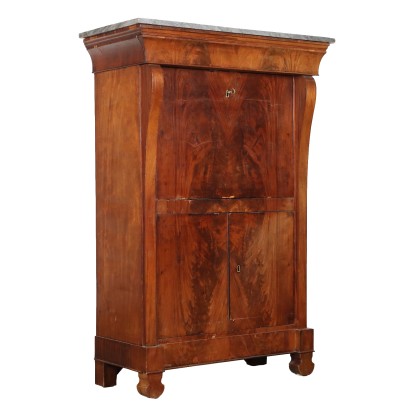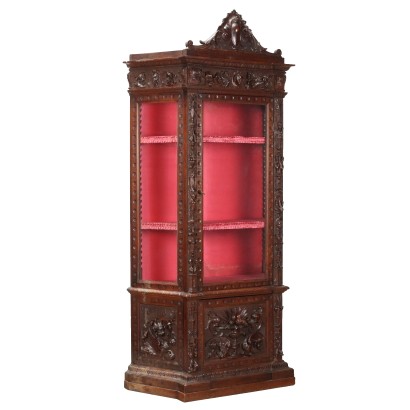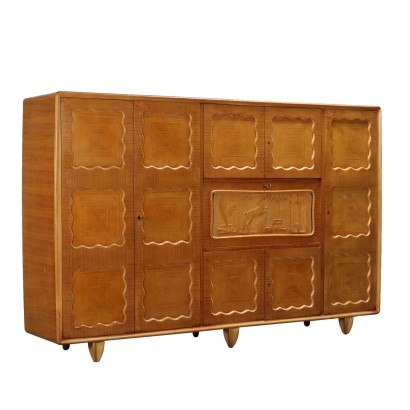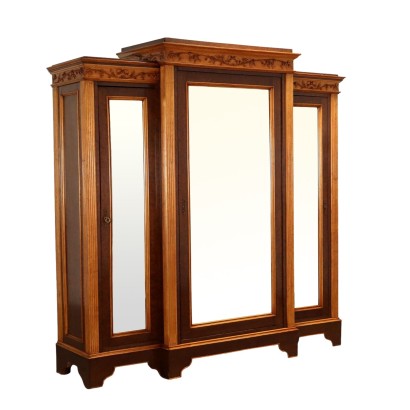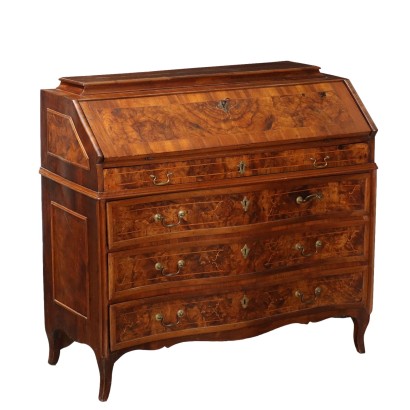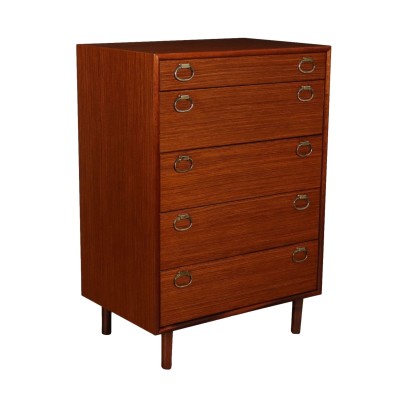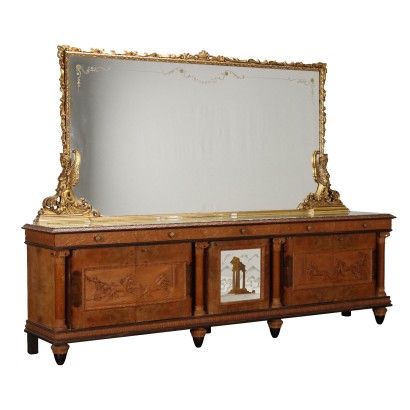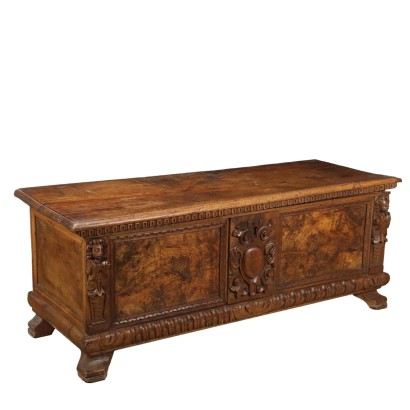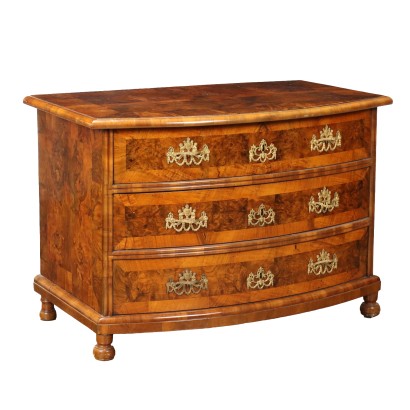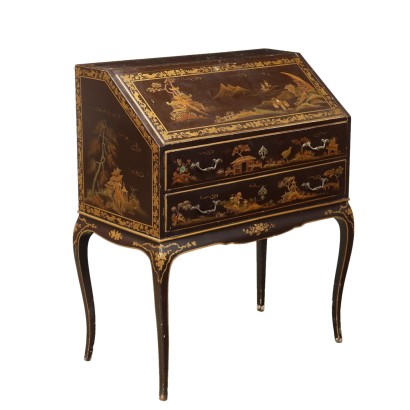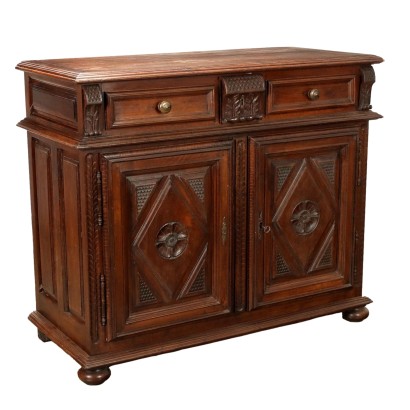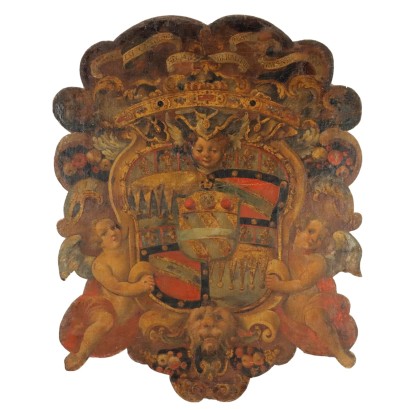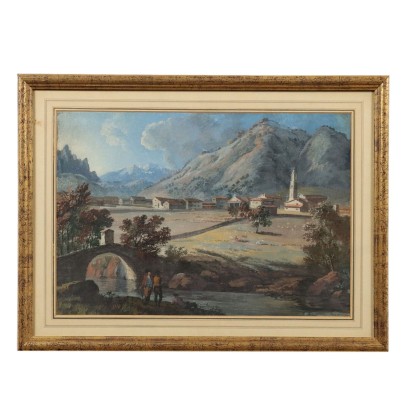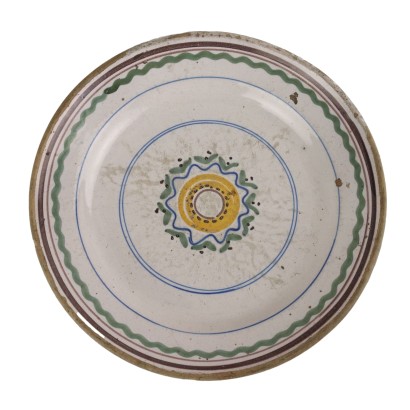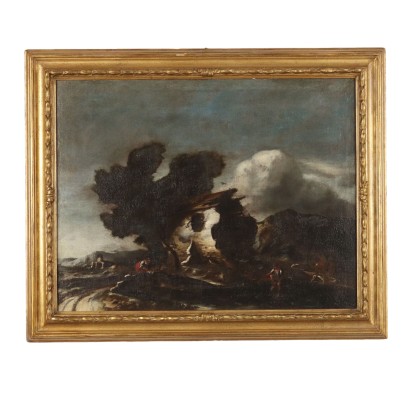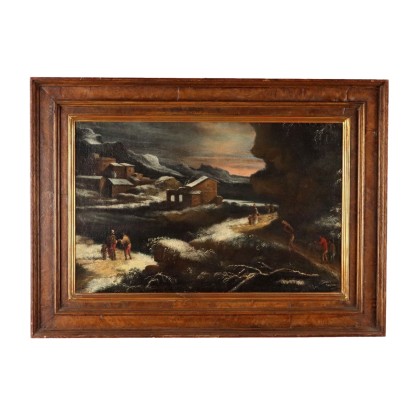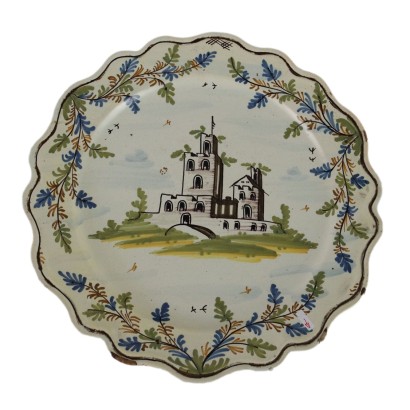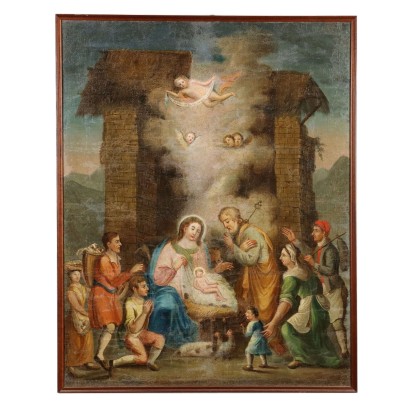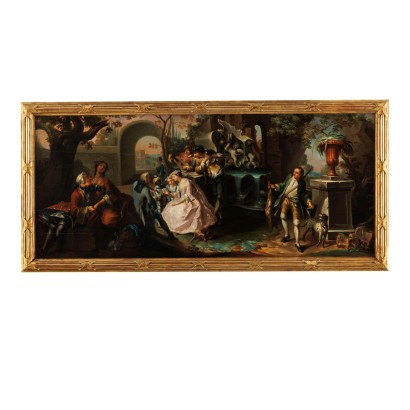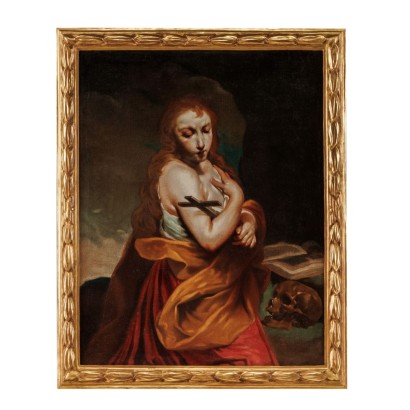Neoclassical Secrétaire Mahogany France XVIII Century - France Last quarter of the 18th century
Features
France Last quarter of the 18th century
Style: Neo-Classical (1765-1790)
Age: 18th Century / 1701 - 1800
Origin: France
Main essence: Maple , Satinwood , Mahogany , Oak
Material: Leather , Exotic Species , Painted Wood , Lacquered Wood
Description
French Neoclassical secrétaire in various exotic woods, France, last quarter of the 18th century. Tray top finely inlaid with geometric fret in maple and mahogany on the edge, drawer in the band, flap door concealing internal compartment veneered in mahogany and maple with Moroccan insert, pair of doors, 45 ° uprights ending with 45 ° truncated pyramidal feet . Entirely threaded and inlaid with geometric motifs, ropes and ribbons knotted in maple. Front decorated with citronnier folder and chinoiserie lacquered reserves, painted in gold on a black background with a vegetable theme; side folders and mahogany top. Oak interior. Missing castle.
Product Condition:
Product that due to age and usage requires restoration and polish works.
Dimensions (cm):
Height: 148,5
Width: 86
Depth: 41
Additional Information
Style: Neo-Classical (1765-1790)
This historical period includes a first phase that can be properly defined as the Louis XVI style.nOnly at a later time, with the maturation of archaeological fashions, was a new vision of furnishing civilization formulated and codified, now fully attributable to the Neoclassical Style.
In fact, both trends coexisted in unison until the last years of the eighteenth century.
nIn the field of cabinet making, the Directoire, Retour d'Egypte, Consular and Empire styles also fall within the neoclassical era.
nFind out more about Neoclassicism with the insights from our blog...
n
Age: 18th Century / 1701 - 1800
18th Century / 1701 - 1800Main essence:
Maple
Hard, light wood used for inlays. It grows mainly in Austria, but it is widespread throughout the northern hemisphere, from Japan to North America, passing through China and Europe. It is one of the lightest woods ever, tending to white, it is similar to lime or birch wood. The briar is used in the production of ancient secretaires .Satinwood
The name is common in France for citrus limonum , the fruit tree of the lemon. From this plant a light, solid and fragrant wood is obtained, used in the construction of furniture especially in England and France, where it was appreciated for its resistance.Mahogany
It is one of the most precious and sought-after woods in cabinet making. It was discovered in Central America around 1600 and began to be imported to England in the 1700s. Much appreciated for its hardness and indestructibility, it became widespread following the blocking of walnut exports from France in 1720 and the consequent elimination of English import duties on mahogany from the colonies in America and India. The most valuable version comes from Cuba, but it became very expensive. At the end of the 18th century it began to be used also in France in Louis XVI, Directory and Empire furniture, its diffusion declined starting from when Napoleon, in 1810, forbade its import. It was generally used in the manufacture of elegant furniture, due to its characteristics and beautiful grain.Oak
Under the name of oak or oak various types of woods derived from plants of the genus quercus are grouped. They are always resistant, hard and compact woods. Oak is lighter than oak, both are used for more rustic furniture or for the interiors of French and English antique furniture. In other processes it was gradually replaced by the advent of exotic woods considered more valuable since the 18th century.Material:
Leather
Exotic Species
Painted Wood
Lacquered Wood
Other customers have searched:
Tavolini, tavolino antico..
Approfondimenti
Se ti interessano tavoli, tavolini, tavoli a vela, scrivanie, scrittoi e consolle dai un'occhiata ai nostri approfondimenti sul blog...
L'antiquariato dalla A alla Z: il Dizionario dell'Antiquariato
Il dizionario dell'antiquariato - Lastronatura
Il dizionario dell'antiquariato - Mascherone
Il dizionario dell'antiquariato - Natura morta
Il dizionario dell'antiquariato - Opificio
Il dizionario dell'antiquariato - Pastiglia
Il dizionario dell'antiquariato - Savonarola
Il dizionario dell'antiquariato - Rosone
Intaglio barocco con motivo a ricciolo
Sui tavoli:
Il Neobarocco in un grande tavolo dell'800
Il Tavolo a fratino
Sui tavolini:
Breve storia dei tavolini
Un tavolino impero lombardo: segno di egemonia politica
Il tavolino da gioco, questo sconosciuto
Il dizionario dell'antiquariato – tavolino a Commesso
...e alle presentazioni su FineArt
Tavoli antichi:
Tavolo campionario lapideo, Roma, Opificio Raffaelli
Tavolo a vela, attribuibile a Luigi e Angiolo Falcini
Tavolo attribuibile a Luigi e Angiolo Falcini
Gueridon, Regno delle Due Sicilie, primo quarto XIX secolo
Tavoli modernariato e design:
Archivio Borsani, patrimonio di memorie e saperi
Tavolo anni '40 ABV
Tavolo Mario Vender Anni '60
Tavolo anni '50 ABV
Tavolo '522' Gianfranco Frattini per Bernini
Tavolo 'Barium' Luciano Frigerio
Tavolo anni '50, Manifattura Italiana
Tavolini antichi:
Coppia di tavolini Tomaso Buzzi, attribuiti
Tavolino da gioco, Bottega Giuseppe Maggiolini, inizi XIX secolo
Tavolini modernariato:
Tavolino anni '50
Tavolino anni '40 ABV
Approfondimenti
Se ti interessano tavoli, tavolini, tavoli a vela, scrivanie, scrittoi e consolle dai un'occhiata ai nostri approfondimenti sul blog...L'antiquariato dalla A alla Z: il Dizionario dell'Antiquariato
Il dizionario dell'antiquariato - Lastronatura
Il dizionario dell'antiquariato - Mascherone
Il dizionario dell'antiquariato - Natura morta
Il dizionario dell'antiquariato - Opificio
Il dizionario dell'antiquariato - Pastiglia
Il dizionario dell'antiquariato - Savonarola
Il dizionario dell'antiquariato - Rosone
Intaglio barocco con motivo a ricciolo
Sui tavoli:
Il Neobarocco in un grande tavolo dell'800
Il Tavolo a fratino
Sui tavolini:
Breve storia dei tavolini
Un tavolino impero lombardo: segno di egemonia politica
Il tavolino da gioco, questo sconosciuto
Il dizionario dell'antiquariato – tavolino a Commesso
...e alle presentazioni su FineArt
Tavoli antichi:
Tavolo campionario lapideo, Roma, Opificio Raffaelli
Tavolo a vela, attribuibile a Luigi e Angiolo Falcini
Tavolo attribuibile a Luigi e Angiolo Falcini
Gueridon, Regno delle Due Sicilie, primo quarto XIX secolo
Tavoli modernariato e design:
Archivio Borsani, patrimonio di memorie e saperi
Tavolo anni '40 ABV
Tavolo Mario Vender Anni '60
Tavolo anni '50 ABV
Tavolo '522' Gianfranco Frattini per Bernini
Tavolo 'Barium' Luciano Frigerio
Tavolo anni '50, Manifattura Italiana
Tavolini antichi:
Coppia di tavolini Tomaso Buzzi, attribuiti
Tavolino da gioco, Bottega Giuseppe Maggiolini, inizi XIX secolo
Tavolini modernariato:
Tavolino anni '50
Tavolino anni '40 ABV

